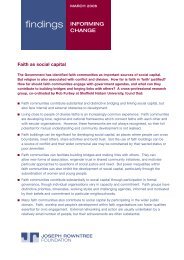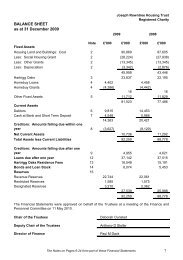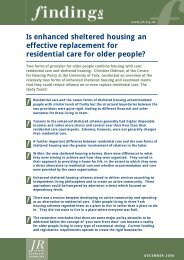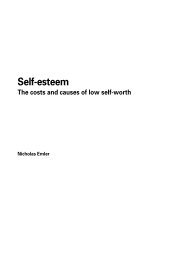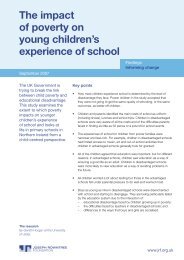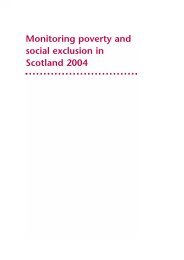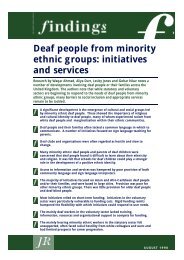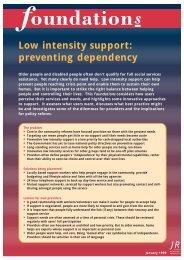Community participation - Joseph Rowntree Foundation
Community participation - Joseph Rowntree Foundation
Community participation - Joseph Rowntree Foundation
You also want an ePaper? Increase the reach of your titles
YUMPU automatically turns print PDFs into web optimized ePapers that Google loves.
<strong>Community</strong> <strong>participation</strong><br />
they are focused on the things that people most immediately care about and can<br />
respond to them. 13 The question is, can we harness this capability so that formal<br />
governance also benefits from it, by empowering these organisations to act as<br />
everyday intermediaries between citizens and formal governance?<br />
Of course, the best community representatives already choose to work through this<br />
civic infrastructure as a way of mobilising support and ensuring legitimacy. Building<br />
on this existing good practice, are there aspects of institutional design that could turn<br />
this from a choice made by some to a requirement expected of all?<br />
One democratic innovation that might help would be the establishment of a local<br />
right of initiative. This would allow citizens to set the political agenda directly by<br />
demanding a local body like a local authority or police force to take action on a<br />
particular issue of concern. This is similar to the ‘trigger’ powers being envisaged as<br />
part of the Government’s plans for neighbourhood governance, 14 but is more<br />
ambitious in the types of responses that might be demanded. Having a right of<br />
initiative ensures that citizens can put something on an institution’s agenda even if<br />
their community representatives are reluctant to do so. <strong>Community</strong> organisations<br />
would be well placed to mobilise the collection of the signatures required to trigger<br />
the right of initiative, creating a clear incentive for community representatives to<br />
engage them before that became necessary.<br />
Long-term capacity building for <strong>participation</strong><br />
A key part of The 1% Solution is to ask which interventions, in the long term, stand<br />
the best chance of promoting <strong>participation</strong> among ever greater numbers of people.<br />
A sensible option would be to merge local education authority (LEA) school governor<br />
services, <strong>Community</strong> Empowerment Networks and other community <strong>participation</strong><br />
support functions to create a local <strong>Community</strong> Governance Service. The long-term<br />
goal of such a service should be to grow and diversify the pool of people involved in<br />
governance. It would play the key co-ordinating role in local areas, marketing<br />
governance opportunities, commissioning training and support, engaging in<br />
outreach, facilitating networking by participants, supporting succession management,<br />
and helping participants to consult, engage, mobilise and sustain relationships with<br />
their communities rather than being cut off from them.<br />
Responsibility for delivering this service should be outsourced to local community<br />
organisations that have the know-how about mobilising people to get involved, and<br />
the infrastructure to link formal <strong>participation</strong> with the community groups, clubs and<br />
58



